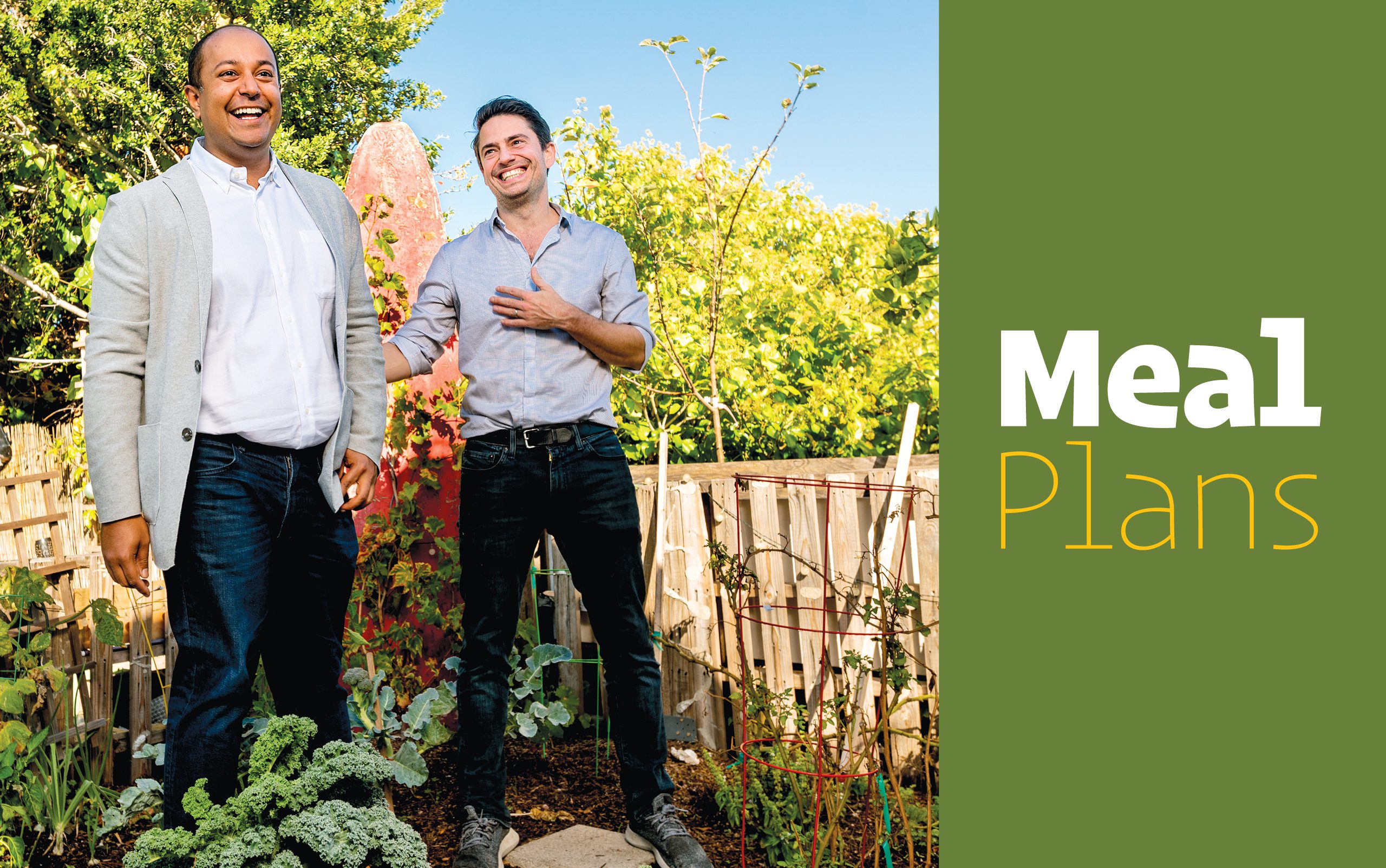Rethinking food from the ground up
Few industries encapsulate the most challenging issues of our time—personal, public, and planetary health—as dramatically as food and agriculture.

“The outcomes of poor diet as they manifest in chronic disease and social and racial inequity, and now climate change, have become urgent,” says Will Rosenzweig (shown right), director of the Sustainable Food Initiative at Haas. It’s his job to prepare the leaders and trailblazers who will make the business of food one that allows society and our planet to thrive.
The stakes could hardly be higher. A United Nations-backed study published in Nature Food revealed that more than a third of global greenhouse gas emissions caused by human activity can be attributed to the way we produce, process, and package food—and that 71% of that comes from agriculture and land use. And if we don’t significantly reduce these emissions, says research published in One Earth, by the end of the century up to a third of the world’s food production will be at risk due to extreme weather, undermining food security for large parts of the planet.
Clearly the food and agriculture industry is ripe for innovation—some might even say it’s in need of a total overhaul. But the shift to sustainable business requires large amounts of capital and leaders to guide large-scale transformation. For the last decade, Haas students and alumni have been reimagining every aspect of food and using their business acumen to create a food system that is not only economically viable but better for consumers, producers, and the planet.
Fixing a broken System
When it comes to the scope of the challenge, Francois-Jerome Selosse, MBA 18, doesn’t mince words. “Our food system is basically broken,” he says. “Ninety-nine percent of the agriculture in the U.S. is done conventionally and is dependent on caustic chemicals like pesticides and destructive soil practices like tillage. Conventional farming creates enormous negative externalities for the land, for the people who steward the land, and for the health of the people who consume the end products.”
Selosse and Adrian Rodrigues, MBA 18 (shown at top of page), started Provenance Capital Group (PCG) in 2019 to focus on regenerative agriculture, which utilizes farming techniques that restore health to the soil, water, and surrounding resources. The result is land that can sequester carbon, retain nutrients, and help with water retention, especially crucial in the face of extended droughts.
Their task is to solve one of the greatest challenges of their generation. “How do you finance regenerative agriculture systems,” says Rodrigues, “when the financial structures of vogue, such as venture capital and private equity funds, don’t align with the time horizon and return profile of living systems?”
At PCG, Selosse and Rodrigues, both former Wall Street financiers, advise eco-friendly enterprises—from a producer of biodynamic baby food to a processor of regeneratively produced meats—and then connect them with capital partners who are aligned with their mission.
One of the ventures they’ve helped succeed is Encina Farms. Encina’s ranchers raise pigs that produce Iberico pork—a prized meat that traditionally comes from Spain—on 650 acres in Northern California. The pigs feed on acorns, which are plentiful on the land.
“California has as many oak woodlands as Spain does,” Selosse says. “They’re a key part of the California ecosystem, yet they’re disappearing because landowners don’t see much value in them.” Often oaks are cleared to create vineyards. Encina is using the land to raise pigs holistically in a manner that not only helps it regenerate but also reduces its fire risk. Oak trees are naturally fire resistant if the fire isn’t too intense, and the pigs’ foraging helps reduce the brush that fuels fires.
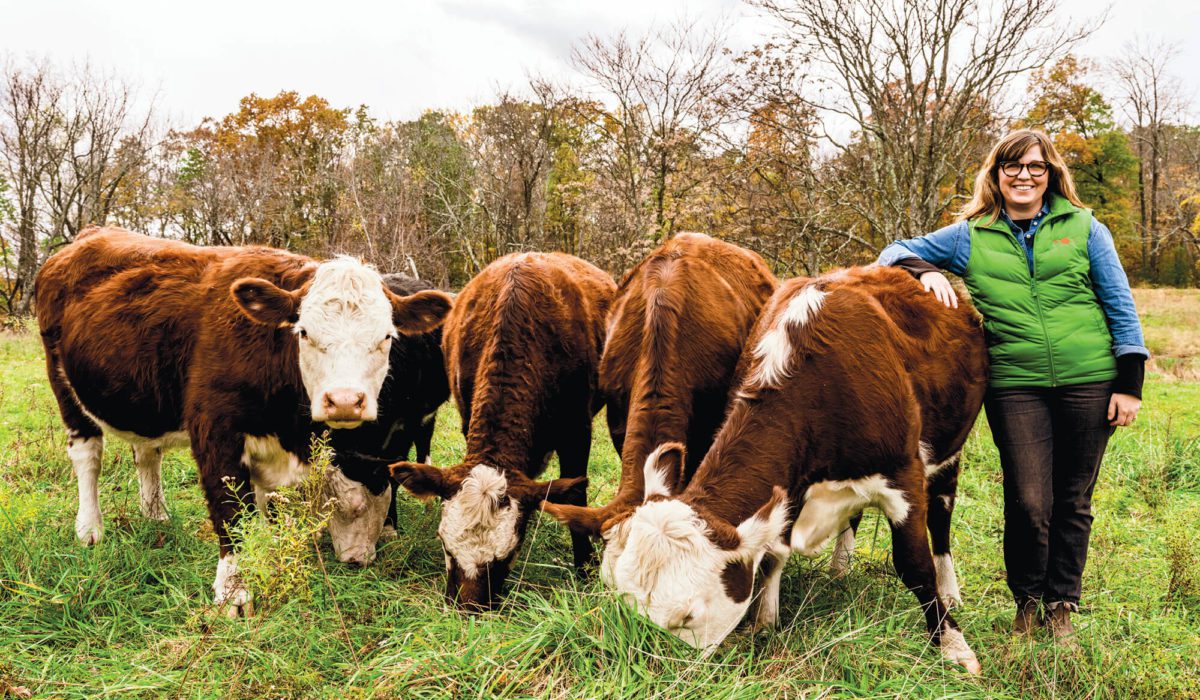
Championing green supply chains

Kyle Rudzinski, MBA 14 (shown right), the vice president of operations at rePlant Capital, says rePlant is on a mission to reverse climate change at scale and help the agriculture system transition to regenerative practices. The financial services firm works with large food and beverage companies like Danone to identify suppliers, farmers, and ranchers who are interested in restoring soil health, enhancing biodiversity, and increasing their profitability—not just yield. They then help these producers through loans and other accessible, low-interest and no-interest forms of financing.
McCarty Family Farms, a dairy supplier to Danone, is one of the farms they’re partnering with. “They understand they have to move into more regenerative practices,” Rudzinski says. “A lot of farmers are seeing the real impacts of climate change and saying, ‘I need to build a more resilient farm because the risks are increasing.’” He says that rePlant’s goal is to deploy $2 billion over the next decade toward building soil health.

Elaine Hsu, MBA 19 (shown left), and Planet FWD are tackling the issue from another angle. Planet FWD offers software and services to food brands to help them assess and improve their carbon footprint—and then get that message out to consumers.
“The need to understand your carbon footprint and communicate it applies to brands of all sizes,” says Hsu, who handles operations and sourcing at Planet FWD. Yet large and small companies may take different paths to a better supply chain. “Identifying more sustainable suppliers works best for smaller brands, who can more easily switch suppliers.” Established brands with significant demand may instead use their influence to move current suppliers in a sustainable direction. In addition to assisting other brands, Planet FWD has developed its own, Moonshot, which has a line of climate-friendly crackers.
Increasingly, established brands are on board with sustainability. Jenny Burns, MBA 12 (large photo, above), the director of innovation at meat producer Applegate, says the company is wholeheartedly embracing regenerative methods.
While conventionally raised meat poses problems for the environment, Burns says animals are an integral component of a regenerative system. “When you look at the way soil regenerates, it has to include animals,” she says.
But given that Applegate doesn’t own any farms and instead contracts and partners with individual farmers, a focus on regenerative meat only happens after a long innovation cycle, sometimes lasting years. The animals have to be custom raised and Applegate’s label claims must be approved by the U.S. Department of Agriculture before coming to market. “We’ve been working to basically build these systems from scratch,” Burns says.
This fall the company is launching a beef hot dog that’s sourced entirely from regenerative systems and is relying on education and messaging to entice consumers. While the nuts and bolts of regenerative agriculture can get a bit dry, the bottom-line message resonates. “When you say, ‘This hot dog is made with clean simple ingredients, it’s delicious, and it can help make an impact on our climate,’ people get really excited,” Burns says.
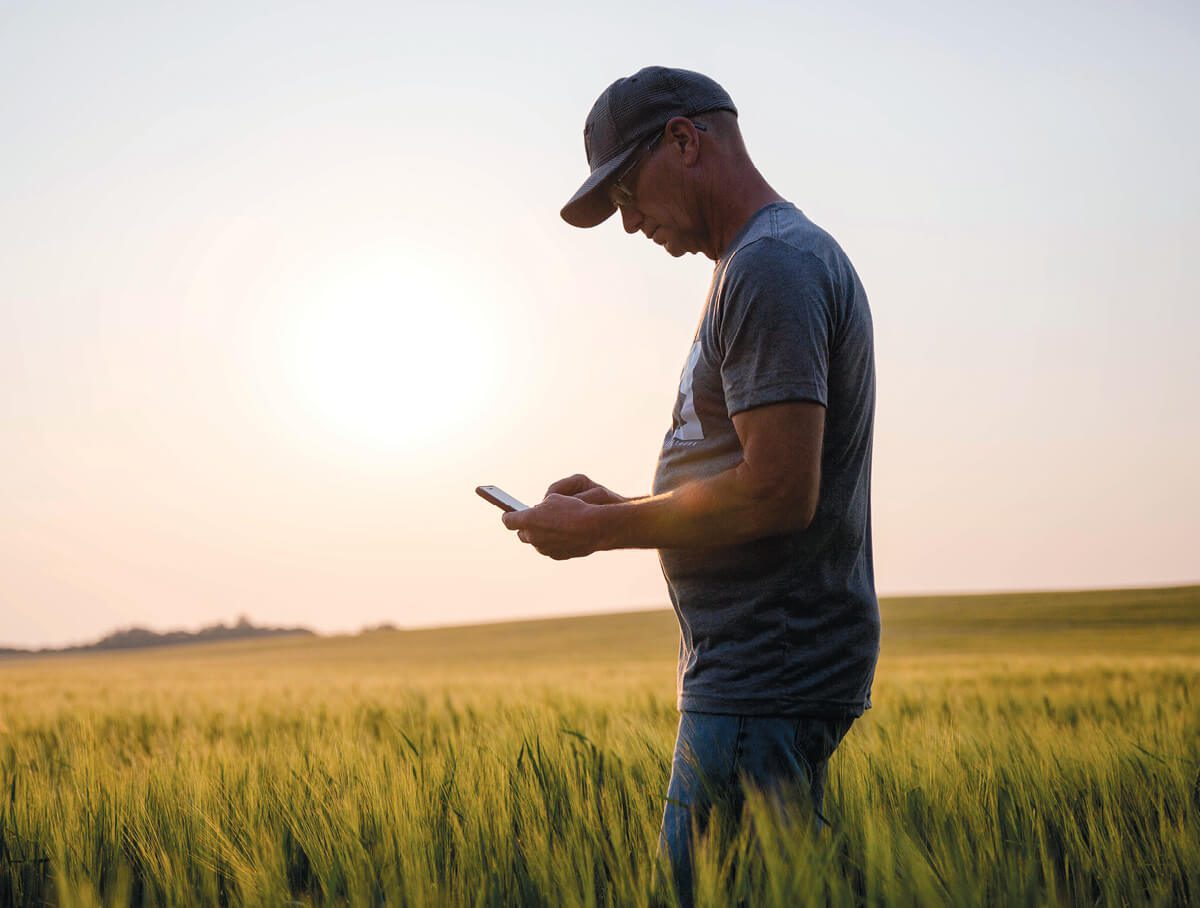
Focusing on farmers
Of course, farmland is nothing without people to work it. Anthony Chang, BS 99 (shown below), founded Kitchen Table Advisors (KTA) in 2013 to advise farmers on business and financial management and accessing capital. He focuses on people historically excluded from resources, particularly immigrants, women, people of color, and members of the LGBTQ+ community.

“The farmers we work with are hardworking and naturally entrepreneurial,” Chang says, “but they’re still making $15,000 to $30,000 a year.” Chang, himself the son of immigrant small-business owners, knows how hard it can be for some to succeed. The industrialized food system, he says, depletes the land and disempowers the very people wanting to farm responsibly.
“It’s clear to us that the systems small organic farmers work in aren’t built for them,” he says. “We’re trying to disrupt those systems and influence institutions that control land and markets and capital to work better for farmers.” Since its founding, the nonprofit KTA has supported more than 80 sustainable small-scale farms and ranches throughout Northern California.
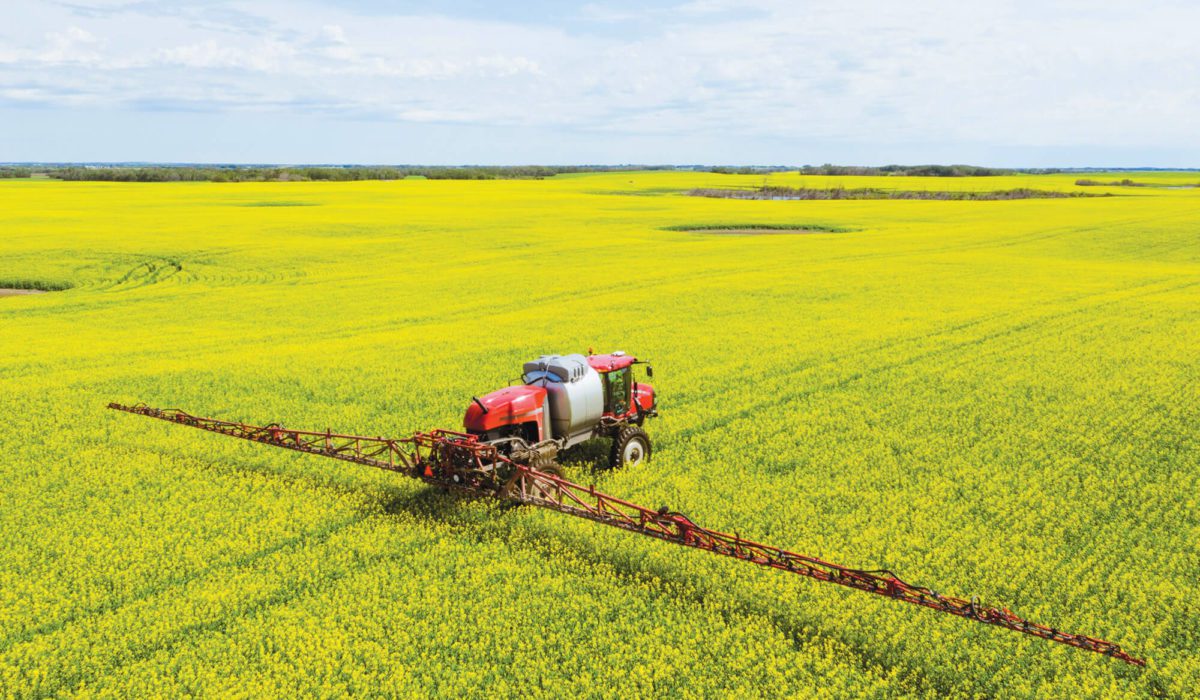

Steele Lorenz, MBA 19 (shown right), also supports growers in his role as the head of sustainable business at Farmers Business Network. FBN began as an online platform where farmers could share information about how they farm. Since then, Lorenz says, it’s expanded to offer e-commerce and financial services.
Lorenz’s work marries sustainability with a better bottom line. “
The business I’m in is helping growers get premiums—paid more, essentially—for the environmental claims that come from their lands.” As farmers transition to regenerative practices that capture and store carbon, they’re gaining a second, valuable commodity—the carbon itself. Lorenz and FBN help growers find buyers for the carbon, either through the supply chain or in the offset credit market.
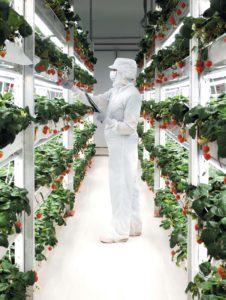
less soil and water and fewer pesticides. It’s the first commercial indoor farm to use bees to pollinate its super-sweet strawberry variety. Photo: Courtesy Oishii Farms.
Growing food vertically

While a lot of work is focused on regenerating the land, an other major innovation moves the farming inside. Vertical farms grow produce in stacked rows, under tightly controlled conditions that don’t depend on weather—which means using less soil and water and fewer pesticides. Right now the majority of vertical farmers grow leafy greens, but Hiroki Koga, MBA 17 (shown left), co-founder of Oishii Farms in New Jersey and Los Angeles, set his sights on something sweeter: strawberries.
“Strawberries have been said to be the holy grail of vertical farming,” says Koga, who first learned about the growing technique in Japan, where he worked as a consultant before coming to Haas. “They’re especially hard to control because they require pollination.”
Oishii is the first commercial indoor farm to use bees to pollinate its super-sweet strawberry variety called the Omakase, which until now was grown only in the Japanese Alps. Oishii can grow its strawberries anywhere year-round. “They can even be grown in the desert,” Koga says.
The strawberries aren’t cheap—they sell for between $5 and $8 each—but the company just raised $50 million, which they’ll use to develop a more affordable berry; expand into other crops such as tomatoes, melons, and peppers; and build new farms. Koga says their next commercial-scale farm plans to run entirely on renewable energy.
If the food system demands deep repair, it’s clear the work has already begun. The Sustainable Food Initiative’s Rosenzweig is thrilled but not surprised to see how passionately Haas students and alumni are taking up these challenges.
“Berkeley’s combination of science, research, and social conscience is the perfect place to lead the way,” he says.
